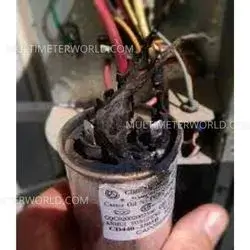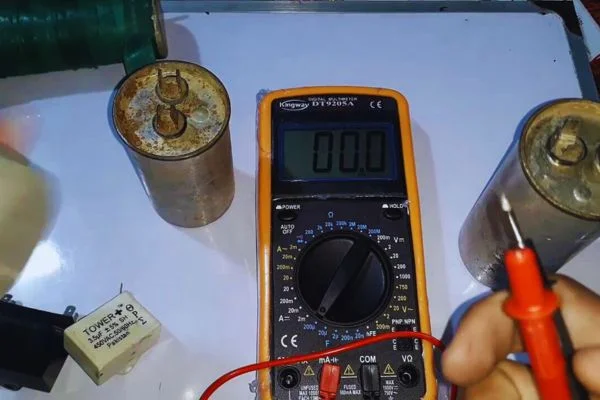If you're having problems with your air conditioner, the capacitor may be blamed. A bad capacitor can cause the AC unit to blow a fuse or stop working altogether. This blog post will show you how to test an AC capacitor with a digital multimeter. But if you want to fix your HVAC system, you must know about capacitors and their working.
What is a capacitor?
An air conditioner capacitor is a small, cylindrical device that stores electrical energy. The capacitor provides power to the AC unit's compressor and fan motor. Basically, it gives a boost of energy to AC to start up.
Why do capacitors fail?
There are several reasons why an AC capacitor may fail. The most common reason is age. Over time, the capacitor will lose its ability to hold a charge. Other causes of failure include corrosion, loose connections, and overheating.

How do you know if your AC capacitor is bad?
There are a few signs that indicate a bad AC capacitor. If your AC unit is blowing fuses, not starting up, or running but not cooling, the capacitor may be to blame. So, if you suspect a problem with the capacitor, it's time to test it.
Tools required to test an AC capacitor
- Multimeter (Analog/Digital)
- Thimble pressor
- Cable lugs
- pliers
- Screwdriver
How do you test an AC capacitor with a digital multimeter?
You can test an AC capacitor with a digital multimeter. Before performing any such test turn off the power to the air conditioner at the breaker box.
Now check if there is any sign of leaking or burnt wiring; if yes, then your capacitor needs to be replaced.

Step By Step Guide
- First of all, set your multimeter to AC capacitance; if it's an auto-ranging multimeter, then it's great. Otherwise, you have to set it according to the capacitor's capacitance.
- Now, touch one probe of the multimeter to one of the terminals on the capacitor, and connect the other probe to the other terminal. If the reading is close to the rated value, the capacitor is in good condition.
- However, if the reading is good, but your AC is still not working, there must be a loosing in jacks or carbon on cable lugs.
- If there is any loosing in terminals or carbon, wash it with a CRC contact cleaner and renew the cable lugs properly.
- Hopefully, your Air-conditioning system will now be running smoothly. However, if it's not working well now, you must contact your HVAC technician.
Things not to do while testing AC Capacitors
- Capacitors always hold a charge even if they are not connected to the power, so before you do anything, make sure that you have turned off the power at the breaker box.
- Do not touch both terminals of the capacitor simultaneously with your bare hands. This can cause an electric shock.
- Always discharge the capacitors by shorting both terminals with each other through a 4mm insulated cable

If you have any doubt regarding the capacitor, don't hesitate to consult with an expert.
So, this is how you can test an AC capacitor with a digital multimeter. By following these simple steps, you can easily troubleshoot your air conditioner.If you know more about the compression of Fluke and Klein, then click here.
Which multimeter should you buy for testing AC Capacitors?
There are many multimeters available in the market, from $30 to $500. But it depends upon your budget and use. If you're an HVAC professional who frequently tests AC capacitors with a multimeter, go for a Fluke 116/323 HVAC kit. You can also choose a clamp meter for HVAC testing purposes. I have made a list of the best clamp meters for HVAC work.
For beginners or DIYers, I personally recommend a multimeter that is safe to use and budget-friendly as well, so you can choose any of the multimeters from our list of best multimeters for HVAC work.
Conclusion
I hope this guide was helpful in testing an AC capacitor with a digital multimeter. Although a bad capacitor doesn't need to be the only cause of your AC problems, testing it's still a good idea. Moreover, If you have any questions or suggestions, feel free to leave a comment below. Thanks for landing here!
Share this guide with your loved ones, so they don't get stuck in air conditioning problems anymore.
